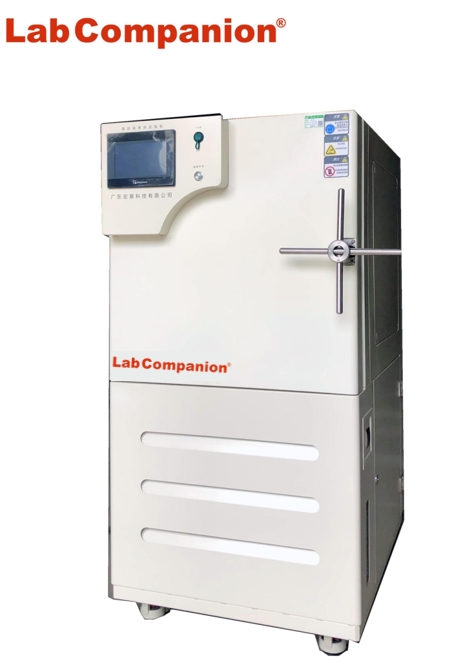PCT Test Purpose and Application (3)
/ /PCT Test Purpose and Application (3)
The way water vapor enters the IC package:
1. Water absorbed by IC chip and lead frame and silver paste used in SMT
2. Moisture absorbed in the plastic sealing material
3. The device may be affected when the humidity in the plastic sealing room is high;
4. After the encapsulation of the device, water vapor permeates through the plastic sealant and the gap between the plastic sealant and the lead frame, because there is only a mechanical combination between the plastic and the lead frame, so there is inevitably a small gap between the lead frame and the plastic.
Note: As long as the gap between the sealant is greater than 3.4*10^-10m, water molecules can pass through the sealant protection Note: The airtight package is not sensitive to water vapor, generally do not use accelerated temperature and humidity test to evaluate its reliability, but to measure its air tightness, internal water vapor content, etc.
PCT test description for JESD22-A102:
It is used to evaluate the integrity of non-airtight packaged devices against water vapor in water vapor condensation or saturated water vapor environments. The sample is placed in a condensed, high-humidity environment under high pressure to allow water vapor to enter the package, exposing weaknesses in the package such as corrosion of the delamination and metallization layers. This test is used to evaluate new package structures or updates of materials and designs in the package body. It should be noted that there will be some internal or external failure mechanisms in this test that do not match the actual application situation. Since absorbed water vapor reduces the glass transition temperature of most polymer materials, an unreal failure mode may occur when the temperature is higher than the glass transition temperature.
External pin tin short circuit: The ionization effect caused by moisture in the package external pin will cause abnormal growth of ion migration, resulting in short circuit between pins.
Moisture causes corrosion inside the package:
The cracks caused by the moisture through the packaging process bring external ion contamination to the surface of the wafer, and after passing through the surface defects such as: protective layer pinholes, cracks, poor covers... Etc., into the semiconductor original, causing corrosion and leakage current... Such problems, if there is applied bias then the fault is more likely to occur.
PCT test conditions:
(Collate PCB, PCT, IC semiconductor and related materials have relevant test conditions on PCT[steam pot test]) PCT test purpose and application
|
Test name |
temperature |
humidity |
time |
Check items & add notes |
|
JEDEC-22-A102 |
121 ℃ |
100%R.H. |
168h |
Other test time: 24h, 48h, 96h, 168h, 240h, 336h |
|
Tensile stripping strength test of IPC-FC-241B-PCB copper laminated laminates |
121 ℃ |
100%R.H. |
100 h |
The strength of the copper layer should be 1000 N/m |
|
IC-Auto Clave test |
121 ℃ |
100%R.H. |
288h |
|
|
Low dielectric high heat resistant multilayer board |
121 ℃ |
100%R.H. |
192h |
|
|
PCB plug agent |
121 ℃ |
100%R.H. |
192h |
|
|
PCB-PCT test |
121 ℃ |
100%R.H. |
30min |
Check: Layers, bubbles, white spots |
|
Lead-free solder accelerated life 1 |
100 ℃ |
100%R.H. |
8h |
Equivalent to 6 months under high temperature and humidity, activation energy =4.44eV |
|
Lead-free solder accelerated life 2 |
100 ℃ |
100%R.H. |
16h |
Equivalent to a year of high temperature and humidity, activation energy =4.44eV |
|
IC lead-free test |
121 ℃ |
100%R.H. |
1000h |
Check every 500 hours |
|
Liquid crystal panel adhesion test |
121 ℃ |
100%R.H. |
12h |
|
|
Metal gasket |
121 ℃ |
100%R.H. |
24h |
|
|
Semiconductor package test |
121 ℃ |
100%R.H. |
500, 1000 hours |
|
|
PCB moisture absorption test |
121 ℃ |
100%R.H. |
5, 8h |
|
|
FPC moisture absorption test |
121 ℃ |
100%R.H. |
192h |
|
|
PCB plug agent |
121 ℃ |
100%R.H. |
192h |
|
|
Multilayer material with low dielectric power and high heat resistance |
121 ℃ |
100%R.H. |
5h |
Water absorption is less than 0.4 ~ 0.6% |
|
High TG glass epoxy multilayer printed circuit board material |
121 ℃ |
100%R.H. |
5h |
Water absorption is less than 0.55 ~ 0.65% |
|
High TG glass epoxy multilayer printed circuit board - Heat resistance test after hygroscopic reflow welding |
121 ℃ |
100%R.H. |
3h |
Heat resistance test of reflow welding after PCT test is completed (260℃/30 seconds) |
|
Micro-etching Horizontal Browning (Co-Bra Bond) |
121 ℃ |
100%R.H. |
168h |
|
|
Automotive PCB |
121 ℃ |
100%R.H. |
50, 100h |
|
|
PCB for the main board |
121 ℃ |
100%R.H. |
30min |
|
|
GBA carrier board |
121 ℃ |
100%R.H. |
24h |
|
|
Accelerated wet resistance test of semiconductor devices |
121 ℃ |
100%R.H. |
8h |
|
